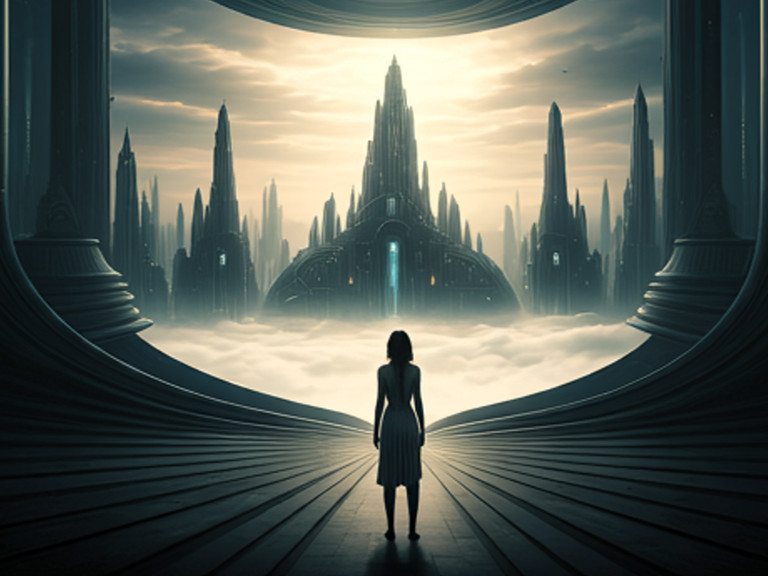Justamente en mi anterior publicación sobre el mito de Phaeton, hablaba un poco sobre una novela de nombre "El Informe Phaeton", cuyo autor es Albert Salvadó. La razón por la cual decidí escribir sobre un tema relacionado al feminismo es porque precisamente allí en esa novela se habla de una civilización humana avanzada cuyo modelo de sociedad es descrito por el autor como "matricentrismo", haciendo a la vez una cierta comparación con el "patriarcado" bíblico descrito en las escrituras.
Este es el enlace de la iniciativa: INICIATIVA: Un tema para cada día (Octubre 2024). En la comunidad Humanitas. El tema del feminismo correspondía al día 22 de octubre.

El matricentrismo podría describirse como un modelo de sociedad en el cual la mujer, más específicamente la madre, cumple un rol central o muy importante. El nombre suena muy sofisticado, de hecho me recuerda un poco a la palabra "matriz" utilizada en el álgebra para describir un conjunto de números ordenados en filas y columnas, o inclusive a "Matrix", la famosa película.
En dicha novela se habla de una sociedad humana que avanzó a niveles de desarrollo tecnológico inimaginables y que luego cayó, dando origen a un Diluvio que reinició la vida en la Tierra y que siguió hasta nuestros días. Se describe a dicha civilización como "matricentrista", en el cual la mujer ocupaba un rol muy importante.
Albert Salvadó, autor catalán, describe también en la novela que era una sociedad matricentrista y socialista, también en contraposición con el patriarcado-capitalismo de nuestra sociedad moderna, aunque bien no estoy del todo de acuerdo con esta afirmación. Creo que una sociedad muy matricentrista puede llegar a ser muy capitalista, incluso más que en una sociedad patriarcal, al existir estructuras más horizontales y descentralizadas que fomentan mayor libre competencia y mercado (véase, las criptomonedas). Y esto no entraría en conflicto con la idea de una sociedad más cooperativa y menos conflictiva (no habia guerras en la civilización descrita en su novela).
A diferencia de lo que podría denorminarse "patriarcado", en donde el hombre ocuparía un lugar central y dominante, en el matricentrismo la mujer ocupa un lugar central e influyente/organizativo, y por ello se llama así y no "matriarcado". Un ejemplo claro de esto se ve en zonas del mundo como Latinoamérica. Yo mismo podría decir que mi familia es muy matricentrista, y probablemente tú también si tienes raíces latinoamericanas. Ahora bien, no sé si sería correcto afirmar que un mundo regido por este paradigma sería mejor, ya que si somos objetivos habrían puntos positivos tanto en uno como en otro modelo. Es decir, debe haber un equilibrio.
El feminismo en la actualidad es un tópico que trae cierta polémica. Y creo que tiene que ver mucho con su politización. Pero creo que si hay algo en lo que el feminismo moderno no parece centrarse mucho en la actualidad es precisamente el rol de la mujer como madre y como eje en una familia y sociedad. Quizás se enfoca más en su libertad social, pero sin un sentido de comunidad o de unión es difícil que haya una sociedad ue prospere sino más bien una sociedad cada vez más atomizada y en conflicto entre sí. Y eso es algo que, para bien o para mal, es y era proporcionado por estructuras más "patriarcales" como la religión y otras.
Es por ello que es importante un equilibrio, y quizás una sociedad matricentrista quizás podría lograr una mejor armonia y ser una mejor solución. Pero quizás sea raro decir que Latinoamérica suele tener una sociedad matricentrista, viendo que su grado de desarrollo no es como el de Europa, por ejemplo. Quizás se deba a que es una sociedad demasiado matricentrista, en donde paradójicamente esto contribuya a que haya mayor "machismo". Le pregunté a Chat GPT en qué zonas del mundo hay un equilibrio ideal entre patriarcado y matricentrismo y me respondió que esto se da en países escandinavos, Canadá, Nueva Zelanda y otros países de Europa. Precisamente estos entre los países más desarrollados del mundo.
En conclusión, creo que una sociedad ideal podría ser una como la Latinoamericana, en donde la mujer ocupa un rol muy central y organizador, pero en donde el hombre ha logrado desarrollar mejor su rol como lider natural, en perfecto complemento con el rol central de las mujeres, sin conflicto entre ambos. Aclaro también que existen mujeres que pueden ser muy buenas líderes, y hombres que pueden ser muy buenos administradores, así que más bien hablamos de "arquetipos" o la "esencia" tanto masculina como femenina que existe en todos nosotros (te invito a leer este post: Desafiando el Estereotipo: Los Hombres son más Emocionales y las Mujeres más Físicas🚺🚹🔥).

Click here for the English Version
In my previous publication on the Phaeton myth, I talked a little about a novel called “El Informe Phaeton”, whose author is Albert Salvadó. The reason why I decided to write about a topic related to feminism is because precisely in that novel it talks about an advanced human civilization whose model of society is described by the author as “matricentrism”, making at the same time a certain comparison with the biblical “patriarchy” described in the scriptures.
This is the link to the initiative: INITIATIVE: A Theme for Every Day (October 2024). In the Humanitas community. The theme of feminism corresponded to October 22.
Matricentrism could be described as a model of society in which the woman, more specifically the mother, plays a central or very important role. The name sounds very sophisticated, in fact it reminds me a bit of the word “matrix” used in algebra to describe a set of numbers arranged in rows and columns, or even “Matrix”, the famous movie.
The novel tells of a human society that advanced to unimaginable levels of technological development and then fell, giving rise to a Flood that restarted life on Earth and continued to the present day. This civilization is described as “matricentric”, in which women played a very important role.
Albert Salvadó, a Catalan author, also describes in the novel that it was a matricentric and socialist society, also in contrast to the patriarchal-capitalism of our modern society, although I do not entirely agree with this statement. I believe that a very matricentric society can become very capitalist, even more so than in a patriarchal society, as there are more horizontal and decentralized structures that encourage more free competition and market (see, cryptocurrencies). And this would not conflict with the idea of a more cooperative and less conflictual society (there were no wars in the civilization described in his novel).
Unlike what could be called “patriarchy”, where the man would occupy a central and dominant place, in matricentrism the woman occupies a central and influential/organizational place, and that is why it is called that and not “matriarchy”. A clear example of this is seen in areas of the world like Latin America. I myself could say that my family is very matricentric, and probably you too if you have Latin American roots. Now, I don't know if it would be correct to say that a world governed by this paradigm would be better, because if we are objective there would be positive points in both one and the other model. That is to say, there must be a balance.
Feminism today is a topic that brings some controversy. And I think it has a lot to do with its politicization. But I think that if there is something that modern feminism does not seem to focus much on nowadays, it is precisely the role of women as mothers and as the axis of a family and society. Perhaps it focuses more on her social freedom, but without a sense of community or togetherness it is difficult to have a society that thrives but rather a society that is increasingly atomized and in conflict with each other. And that is something that, for better or worse, is and was provided by more “patriarchal” structures such as religion and others.
That is why a balance is important, and perhaps a matricentric society could perhaps achieve a better harmony and be a better solution. But perhaps it is strange to say that Latin America tends to have a matricentric society, seeing that its degree of development is not like that of Europe, for example. Perhaps it is because it is too matricentric society, where paradoxically this contributes to greater “machismo”. I asked Chat GPT in which areas of the world there is an ideal balance between patriarchy and matricentrism and he replied that this occurs in Scandinavian countries, Canada, New Zealand and other European countries. Precisely these are among the most developed countries in the world.
In conclusion, I believe that an ideal society could be one like the Latin American one, where women occupy a very central and organizing role, but where men have managed to better develop their role as natural leaders, in perfect complement with the central role of women, without conflict between the two. I also clarify that there are women who can be very good leaders, and men who can be very good managers, so we rather talk about “archetypes” or the “essence” both masculine and feminine that exists in all of us (I invite you to read this post: Challenging the Stereotype: Men are more Emotional and Women are more Physical🚺🚹🔥.
Translated to English language with the help of DeepL.com
Otras redes sociales:
 |
 |
 |
F1 & motorsports: @acontmotor
Expresión Creativa. Literatura | Entretenimiento | Arte: @acontblog
| ¡Gracias por visitar! — ¡Thanks for visiting!  |
Posted Using InLeo Alpha
La clave está en la complementariedad. Cada uno cumpliendo un rol y ayudándose en la funciones en aquellos puntos donde sean competentes.
!PIZZA
Congratulations @acont! You have completed the following achievement on the Hive blockchain And have been rewarded with New badge(s)
Your next target is to reach 43000 upvotes.
You can view your badges on your board and compare yourself to others in the Ranking
If you no longer want to receive notifications, reply to this comment with the word
STOPCheck out our last posts: